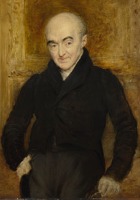Italy : 51. Marco Griffoni Poem by Samuel Rogers
Italy : 51. Marco Griffoni
War is a game at which all are sure to lose, sooner or
later, play they how they will; yet every nation has
delighted in war, and none more in their day than the
little republic of Genoa, whose galleys, while she had
any, were always burning and sinking those of the Pisans,
the Venetians, the Greeks, or the Turks; Christian and
Infidel alike to her.
But experience, when dearly bought, is seldom thrown
away altogether. A moment of sober reflection came at
last; and after a victory the most splendid and ruinous
of any in her annals, she resolved from that day and for
ever to live at peace with all mankind; having in her long
career acquired nothing but glory, and a tax on every
article of life.
Peace came, but with none of its blessings. No stir
in the harbour, no merchandise in the mart or on the
quay; no song as the shuttle was thrown or the plough-
share broke the furrow. The frenzy had left a languor
more alarming than itself. Yet the burden must be borne,
the taxes be gathered; and, year after year, they lay
like a curse on the land, the prospect on every side
growing darker and darker, till an old man entered the
senate-house on his crutches and all was changed.
Marco Griffoni was the last of an ancient family, a
family of royal merchants; and the richest citizen in
Genoa, perhaps in Europe. His parents dying while yet
he lay in the cradle, his wealth had accumulated from the
year of his birth; and so noble a use did he make of it
when he arrived at manhood, that wherever he went, he
was followed by the blessings of the people. He would
often say, 'I hold it only in trust for others;' but Genoa
was then at her old amusement, and the work grew on
his hands. Strong as he was, the evil he had to struggle
with, was stronger than he. His cheerfulness, his alacrity
left him; and, having lifted up his voice for Peace, he
withdrew at once from the sphere of life he had moved
in --- to become, as it were, another man.
From that time and for full fifty years he was to be
seen sitting, like one of the founders of his House, at his
desk among his money-bags, in a narrow street near the
Porto Franco; and he, who in a famine had filled the
granaries of the State, sending to Sicily and even to
Egypt, now lived only as for his heirs, though there were
none to inherit; giving no longer to any -- but lending
to all -- to the rich on their bonds and the poor on their
pledges; lending at the highest rate and exacting with
the utmost rigour. No longer relieving the miserable, he
sought only to enrich himself by their misery; and there
he sate in his gown of frieze, till every finger was pointed
at him in passing and every tongue exclaimed, 'There
sits the Miser!'
But in that character and amidst all that obloquy he
was still the same as ever, still acting to the best of his
judgement for the good of his fellow-citizens; and when
the measure of their calamities was full, when Peace had
come, but come to no purpose, and the lesson, as he
flattered himself, was graven deep in their minds, then,
but not till then, though his hair had long grown grey,
he threw off the mask and gave up all he had, to annihi-
late at a blow his great and cruel adversaries, those taxes
which, when excessive, break the hearts of the people;
a glorious achievement for an individual, though a blood-
less one, and such as only can be conceived possible in a
small community like theirs.
Alas, how little did he know of human nature! How
little had he reflected on the ruling passion of his country-
men, so injurious to others and at length so fatal to
themselves! Almost instantly they grew arrogant and
quarrelsome; almost instantly they were in arms again;
and before the statue was up, that had been voted to his
memory, every tax, if we may believe the historian, was
laid on as before, to awaken vain regrets and wise resolu-
tions.
This poem has not been translated into any other language yet.
I would like to translate this poem